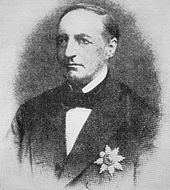Georg Heinrich Bacmeister
Georg Heinrich Julius Friedrich Karl Justus Bacmeister (born February 15, 1807 in Tullamore , Ireland ; † August 3, 1890 in Göttingen ) was minister of the interior, culture and finance as well as prime minister of the Kingdom of Hanover .
Life
Bacmeister came from the Hanoverian line of the traditional Bacmeister family in Lower Saxony. As the son of the captain of the King's German Legion Lucas Wilhelm Bacmeister (1768-1812) and Julia Amalia von Schwartzkopf (1781-1858), he studied law at the University of Göttingen from 1824 to 1827 , where he became a member of the Corps Hannovera . After completing his studies, he entered the Hanoverian civil service. Bacmeister won and enjoyed the special trust of King Ernst August and also drew up his will. Previously, Bacmeister was instrumental in the new version of the civil procedural rules for the Kingdom of Hanoverinvolved, which was rewritten by his lawyer and confidante Adolph Leonhardt based on the French model. In 1851, under the reign of King George V, he was first Minister of Culture in the Schele Ministry, and finally a year later Finance Minister of the Kingdom until the Schele Ministry had to resign in 1853. When the Ministry was reorganized, Bacmeister was no longer taken into account, as he was accused of having allegedly had secret discussions with Otto von Bismarck in order to induce him to join the Hanover government.
In 1855, Bacmeister returned to the civil service and was initially a bailiff in the Lehe office in Lehe , where he expanded the port of Geestemünde . Two years later he was appointed to Landdrost von Ostfriesland . Finally, in 1865, Bacmeister accepted an offer from King George V to rejoin the Hanover government as Minister of the Interior this time. Here he tried to continue his previous reform course. Trying to reach a neutrality treaty with Prussia, he was unable to assert himself in the cabinet or against Rudolf von Bennigsen , although the latter considered him to be one of the most capable officials in living memory . He asked for his release in June 1866, which was granted even before the battle of Langensalza .
During this period of early retirement, Bacmeister returned to studying law at the University of Göttingen. He turned back to his Corps Hannovera in 1874 and was made an honorary doctorate in law by the law school in 1885 .
family
The family belonged to the so-called pretty families in the 18th and 19th centuries . Georg Bacmeister was married to Charlotte Sibylle Theodore Kritter (1814-1884), who gave birth to four sons, two of whom died at the age of 3 and 19. A third son, Georg Arnold Bacmeister (1850–1921), later became President of the District Court of Neuwied as a secret senior judge and was the father of, among others, Adolf Bacmeister (1882–1945), the sea captain and fleet doctor of the reserve and later chief physician of the pulmonary clinic St. Blasien and by Georg Albert Bacmeister (1880–1918), the district administrator of the Usingen and Labiau districts . The fourth son, Julius Joseph Wilhelm Lucas (1855-1916), headed the 63rd Infantry Brigade (5th Royal Saxon) in Bautzen , a subdivision of the 32nd Division (3rd Royal Saxon) , as major general and commander .
Works (selection)
- Report on the jury trial , Hanover, 1851;
- For orientation in the question of judicial reform, from an innocent person , Hanover 1858;
- A vote on the jury courts , Aurich 1862;
- Letter about the next generation in higher administration , printed as Ms., Göttingen 1887
literature
- Ferdinand Frensdorff : Bacmeister, Georg Heinrich Justus . In: Allgemeine Deutsche Biographie (ADB). Volume 46, Duncker & Humblot, Leipzig 1902, pp. 175-180.
- Wilhelm Rothert : General Hannoversche Biography , Volume 2: In the Old Kingdom of Hanover 1814–1866 ; Hanover: Sponholtz, 1914, pp. 44-55
- Bernhard Mühlhan: Bacmeister, Georg. In: New German Biography (NDB). Volume 1, Duncker & Humblot, Berlin 1953, ISBN 3-428-00182-6 , p. 508 ( digitized version ).
- Walter Deeters (Hrsg.): Confidential reports of the Landdrosten Bacmeister from Aurich 1857–1864. Lax, Hildesheim 1989, ISBN 3-7848-2423-4 , ( publications of the Historical Commission for Lower Saxony and Bremen 35, 9).
Web links
- Bacmeister in: Biographical Lexicon for Ostfriesland on ostfriesenelandschaft.de
- Bacmeister's writings documented in the GVK
- Biography and genealogical information
Individual evidence
- ↑ Klaus Mlynek : Pretty families. In: Klaus Mlynek, Waldemar R. Röhrbein (eds.) U. a .: City Lexicon Hanover . From the beginning to the present. Schlütersche, Hannover 2009, ISBN 978-3-89993-662-9 , p. 310.
| personal data | |
|---|---|
| SURNAME | Bacmeister, Georg Heinrich |
| ALTERNATIVE NAMES | Bacmeister, Georg Heinrich Julius Friedrich Karl Justus |
| BRIEF DESCRIPTION | Minister of the Kingdom of Hanover |
| DATE OF BIRTH | February 15, 1807 |
| PLACE OF BIRTH | Tullamore , Ireland |
| DATE OF DEATH | August 3, 1890 |
| Place of death | Goettingen |


